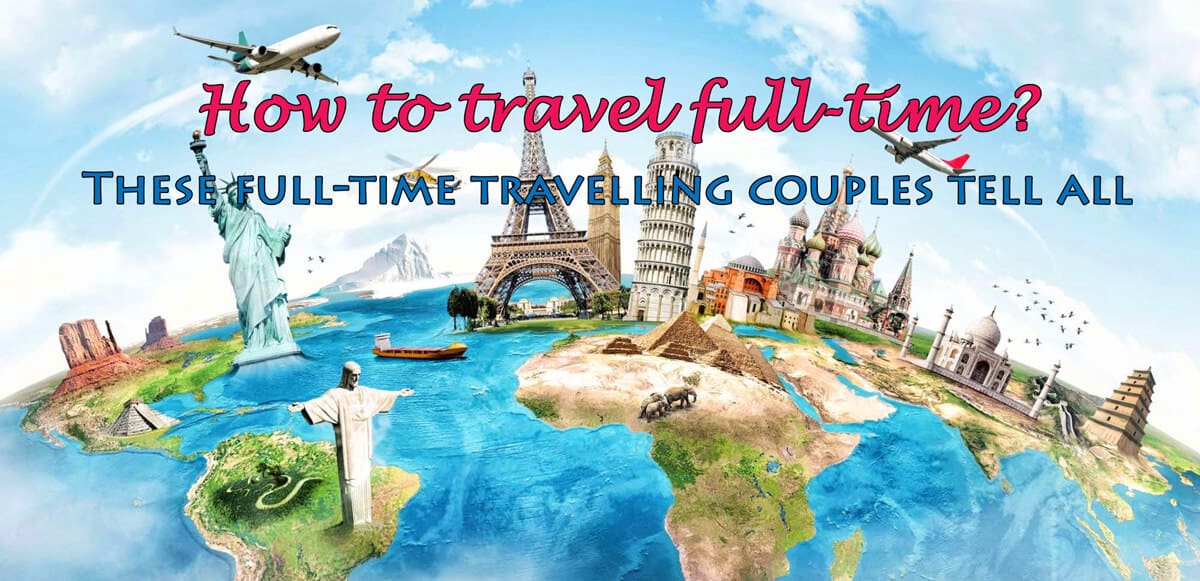 How to travel full-time?
How to travel full-time?
Curious about how people manage to travel full-time? And what a life of full-time travel is like? We interviewed 3 different full-time travelling couples and asked them the same questions. Their backgrounds, ages, and the way they fund their travels (and their budgets) are all different, as are the issues they face on the road and in their lives. Whether you’re ‘mature’ or slightly younger, a digital nomad or a retiree, you’ll find their responses to our questions fascinating.
1. Elena and Andrei
Our first couple is made up of Elena and Andrei. We know Elena from her blog Traveling Bytes. They travel very much as we do and have been at it about the same amount of time. So we’ve always identified with the way they travel.
Tell me about yourself. Where are you from? How long have you been travelling full-time? What led to you deciding to become a nomad?
Hello. My name is Elena Tchijov. I am a full-time traveler since 2013. Leading nomadic lifestyle, I call myself interchangeably a slow traveler, a location independent professional or a digital nomad.
For decades I lived on the East Coast of the United States. I worked in the IT industry. It was an ordinary suburban life. I left a 9-to-5 job in 2010 to start a consulting company together with my husband. In a couple years we came to the conclusion that we do not need to have an office in a particular geographical location. We can work anywhere as long as there is a good internet location.
We both love to travel, but put it off while been full-time employed. Switching to consulting allowed us to start traveling again. First, we moved from the East to the West coast and spent a year in Seattle. Then, we just got more hungry to see the world. Since 2013, we travel full-time.
How do you fund your travels?
Luckily for us, we can work remotely from anywhere as long as we have a decent internet connection.
Do you have a preferred region of the world where you travel? What’s your criteria when choosing where you travel?
Not really. So far, we visited all continents except Antarctica. We do not count how many countries we visited. Our goal is to live through experiences: immerse in different cultures, witness new customs, taste local cuisine and wines.
How do you travel? What amount of time do you usually stay somewhere? What’s your preferred mode of accommodation and what is your daily or monthly budget?
I call our lifestyle slow travel which means that we, generally, stay in one place for about 3 months. Sometimes, for half a year. But we learned that in most cases 6 months is too long. Interestingly, by the end of this period, you become “permanent” in a way. You begin to follow local politics, maybe even growing your own greens and vegetables, get involved in your neighborhood. There is nothing wrong with it. However, it gradually morphs into the same life as we left behind years ago. The only difference is the geographical location. So, what’s the point?
Thus, we rarely spend longer than 3 months in one country. Incidentally, it also happened to be the limit for a visa-less stay for Americans in many countries.
We are lucky to be US citizens. It allows us to travel without a visa in the majority of countries. However, as I said, the typical limit is 90 days or 3 months.
Give me an example of an average day in your life.
The average working day is pretty much the same regardless of geographical location: wake up; about 6-7km power walk; work; lunch; work; workout; dinner… The only difference is that in SE Asia eating out is more prevalent. Years ago, we switched to two-meals-a-day schedule and stuck to it regardless of location.
Weekends and vacations are much more exciting since those are times when we are getting to know our temporary “home” and travel throughout whatever region/country we happen to be at the moment.
Would there ever be a situation in which you would change your current lifestyle? How long do you intend to keep travelling? And what comes after?
Presently, we both are happy with our lifestyle and are not planning to change it anytime soon. Who knows what happens in a few years.
A couples question. How has travelling together strengthened and weakened your relationship?
Over the years, we adjusted the way we travel. It is essential to have some personal space; to have a room for being alone every once in a while. We learned that trying to save money on accommodations doesn’t work for us. Tiny and/or uncomfortable quarters is a prerequisite for travel burnout.
Patience and negotiating skills are as important in a couple’s relationship as in a business one. It might sound obvious, but on the road or in an unfamiliar setting they are lifesavers.
Do you miss not having a base? What is the worst thing for you about not having a base?
My shoe collection had to go 🙁 . Just kidding. Seriously speaking, no, not at all. I love our minimalist nomadic lifestyle. My husband misses having a dog though.
There’s always extreme highs and extreme lows when you travel. What are some of yours?
Travel is unpredictable. You think that you did your research and prepared for everything. Yet, a surprise always is just around the corner.
The lowest low for me came in the autumn of 2017. We managed to get what was called back then the “Australian flu” (ironically, it was in West Australian Perth when it struck us). I got out of that relatively easy. Unfortunately, my husband got full wrath of this awful flu that resulted for him in developing antibiotic-resisting pneumonia as a complication. By then, we were in Portugal. I remember like it was yesterday a horrifying development of sepsis and rushing him into the emergency room fearing the worst. By some miracle, he survived. I am still shaken at how quickly a happy healthy human’s life spirals into the deepest despair. I am very grateful for the excellent medical care provided by Portuguese doctors. As an American, I am also marveling how affordable it was.
Speaking of extreme highs, coming back to Beirut after taking a wrong turn and driving through the snow-covered Lebanese mountains in a tiny hatchback certainly not equipped for winter travel was an elating moment.
Last summer, experiencing the Osaka earthquake in the old Japanese house was something that I would never forget. It felt like I was standing on a small boat in the middle of a storm. It seemed that squeaking and creaking lasted for ages, but in reality, it was less than a minute. Impressively, the house survived without significant damage. I learned a valuable lesson though. While I was fighting gravity and musing about how surreal it felt, it hadn’t occurred to me to seek safety. Frankly, I got scared afterward. Stupid, but lucky. I admit both. Trust me, every shaking after that (and there were plenty of them in 3 months that I spent in Japan) and I was ready to dive under the table.
– Follow Elena and Andrei at on their blog Traveling Bytes.
***
2. Mark and Anya
We’re new to Instagram and haven’t done very well with it, but we somehow connected with Mark and Anya on that platform. They have a great blog named Road is Calling. We’re actually planning on meeting them in a few weeks when going to Georgia (the country, not the state). It’s great seeing young people travelling full-time.
Tell me about yourself. Where are you from? How long have you been traveling full-time? What led to you deciding to become a nomad?
Originally I am from Ukraine and my husband Mark is from Russia but for many years we called the United States our home. There, we got a chance to live in five different states and travel all over the country.
We had a high standard of living but at some point, life got so stressful and exhausting that we stopped enjoying it. Often it felt like the purpose of our life was to work, pay bills, be stuck in traffic and once in a while go on short road trips. That’s it. There was no room for growth, families, friendships and extensive travel which we craved so much.
Two years ago we mutually came to a conclusion that we were not meant to live in one place for too long but wanted to travel the world and live in different countries on different continents. We also strove for more free time and an ability to work for ourselves remotely. The only opportunity to achieve that was through leaving America, moving to a cheaper destination and starting to look for online work.
If we would have learned how to make money online then it would mean we were free to go anywhere we want and when we feel like it.
So in August 2017 we left the U.S. for good and hit the road.
How do you fund your travels?
We had some saved money with us when leaving America but started to work online almost right after departure. At present time we fund all our travels only with the money we make online. Mark constantly picks up IT related projects while I am writing, translating, doing SEO for others and from time to time being a virtual assistant.
Recently our blog started to bring us some passive income too but all earned from it money covers courses, hosting, domain, and a few other blog-related expenses.
Do you have a preferred region of the world where you travel? What’s your criteria when choosing where you travel?
We do not. There are so many countries we want to see and explore (and actually return to) that it’s difficult to come up with the answer for the preferred region.
For now, since we are still not making enough money for setting a base in prime destinations, first things we look at when choosing where to travel next are affordability of a country, visa process, how expensive airfare is and type of climate. Both of us can’t tolerate heat and humidity, so traveling long-term to tropical countries is not our thing. Also, we will always prefer a country that has rich nature scene and offers ample opportunities for hiking.
How do you travel? What amount of time do you usually stay somewhere? What’s your preferred mode of accommodation and what is your daily or monthly budget?
We are slow travelers who love staying in one place as long as we feel like it. Usually, when going to a new country, we rent an apartment for a month to see how we like it. If we connect with the place, we stay longer. If we don’t like it or feel we got enough, we move to another city within the same country or region.
There were countries like Cambodia, for instance, where we originally planned to go to for 6 months but it turned out to be a disappointment and we ran away after 3 weeks in the country. And there were other countries like Montenegro or Vietnam, where we planned to be a few weeks but stayed three months.
When it comes to accommodation, we usually prefer to rent apartments on Airbnb since it gives us more freedom and privacy. It is not always the case though. Sometimes, when wanting to go to a more expensive destination but having a budget of $1000 per month, we choose to housesit or volunteer.
There are months when we make different amounts of money. Sometimes we make less, sometimes we make more. But for the second year in our travels, we try to stick to the rule not to spend more than $1000 per month. Being strict with ourselves gives us some confidence that this travel lifestyle can last and helps us save for the future.
Give me an example of an average day in your life.
You know, with every new country our average day looks differently. In Southeast Asia, we were always waking up early to have breakfast and leave for a day before 9 am. At first, we were going to one of the coffee shops to work, then swim in the pool, ride a scooter, go sightseeing, eat some street food and just walk around. In the evening we were returning home to work some more.
In Europe, we are either working at home a few days in a row and then go on a few days adventure, or we work half a day at home and then move to a coffee shop or just go to explore a city we are based in. In Ukraine, for example, while living in downtown, part of the routine always included morning walks and coffee in one of the lovely cafes and then coming back to work in our apartment.
Now while in Georgia, we are working most of the time, occasionally wandering the streets of Old Town and waiting for the weather to improve and let us go to the mountains.
Would there ever be a situation in which you would change your current lifestyle? How long do you intend to keep travelling? And what comes after?
That’s a good question which we don’t have a solid definite answer to. We are constantly talking about the possibility to settle somewhere and make a base for at least a year but haven’t found an opportunity yet how to make it happen.
There are a lot of countries around the world that offer a digital nomad visa to people who work online but we personally haven’t found a place yet where we really want to settle.
The only situation when we’d probably change our current lifestyle would be at that time when we decide to have children and expand our family. But even then, we know people who are traveling full-time with kids, so we may turn into traveling parents too.
A couples question. How has travelling together strengthened and weakened your relationship?
In the beginning, before going on our adventure, we didn’t have a clue how we were going to spend 24 hours 7 days a week together. Each of us used to work crazy hours and on a good week in total we probably had 30 hours together. So we were afraid that starting full-time travel could damage our relationship.
However, very quickly we realized how much we actually enjoy each other’s company. Throughout these almost 2 years of travel, we learned how to adjust and understand each other better, how to forgive quickly and work together for our mutual success.
The only two things which are missing are friendships and communication with other people. More and more we feel like attending a party or going for a cup of coffee with a friend but it’s always a challenge.
Other than that, our relationship strengthened a lot.
Do you miss not having a base? What is the worst thing for you about not having a base?
We do not miss having a base but believe it would be probably smart to have one. Being based in one place means more stability and order in our life. Especially, when we need to meet deadlines and work a lot.
But knowing our inner selves, even if we base somewhere, sooner or later we’ll start missing the road again.
There’s always extreme highs and extreme lows when you travel. What are some of yours?
One of the lows we experience sometimes is loneliness. It may sound weird since we are always together, but the more we travel the more we understand there are not enough friendships in our life. We are not tired of being with each other, but we are slightly tired of not having social life and meeting with friends.
Also, from time to time we get tired of eating out or not being able to follow a specific diet. I have a few food-related sensitivities and need to eat mainly plant and grain-based meals. However, often in many places, if not having access to the kitchen or being on the road for an extended period of time, it’s simply impossible. At times, our travel turns into a race where we are in search of the “right” food for me instead of having fun and exploring around.
Those are really small things and they don’t bug us a lot. In general, we are truly happy with our lifestyle and still can’t believe it’s happing to us.
– Follow Mark and Anya on their blog Road is Calling.
***
3. Paul and Paula
We connected with Paul and Paula a few years ago when they came across the blog. We want to meet them and somehow (despite going to all the same places) we always seem to miss them. I think they’re avoiding us. We always get a kick out of their blog Luckydog Adventures.
Tell me about yourself. Where are you from? How long have you been travelling full-time? What led to you deciding to become a nomad?
“For my part, I travel not to go anywhere, but to go. I travel for travel’s sake. The great affair is to move; to feel the needs and hitches of our life more nearly; to come down off this feather-bed of civilisation, and find the globe granite underfoot and strewn with cutting flints”.
— Robert Louis Stevenson, From Travels with a Donkey
PAUL – Paula and I both did some traveling before we met. I’d spent a year in Europe after college, which really opened me up to the idea of world travel. In our 50s Paula and I bought a boat in Mexico and spent three years (2003-2006) cruising. It was our first experience as full-time nomads (water-based version).We began to learn how to create a digital existence, setting up automatic payments and making arrangements for mail and bill paying, and communicating with family and friends. (All of which is much easier now!) It was also our first encounter with people running their businesses remotely. (Paula vividly remembers a fellow on his cell phone, talking business as he paced the dock next to his boat named My Other Office.)
Now that we’re retired we can travel full time, so we’ve returned to Europe. We’ve made several month-long trips in the last decade, but only in 2016 did we take off on an open-ended trip. We returned home after 14 months and realized we needed to get back to Europe, which we did six months later. I’m not sure we ever really “decided” to become nomads; we just left and didn’t go home. Twice!
In the Stevenson quote above I don’t relate to the “I travel for travel’s sake” part. I don’t feel like I’m inherently a nomad, traveling just to travel. I want to see new things, experience different cultures, meet other types of people. And, get off this feather-bed! Feel the granite globe, the cutting flints. Life can get too easy, just staying home. We feel the need to get out and sharpen up the dull edges. (So yeah, goal oriented…)
PAULA – I grew up in Connecticut. I think I’ve always been a traveller. When I graduated from college I moved to the West Coast because I had never been there, and ended up living in most of the Western states before moving to California. When Paul and I meet 28 years ago, one of our big attractions was our mutual love of travel. We decided early on, when the time was right, we would travel extensively.
We live in a sweet, small CA coastal town with nice friends. But life was getting too complacent and predictable and we were getting older. It was time for some fun. I feel like a student again. So much to learn about and see. And wonderful people to meet.
How do you fund your travels?
Frugal living for most of our adult lives. Seriously! By the time we retired, we realized we had the means, and the will, to go and not come back. Actually, traveling does not cost us much more than staying home. In California our biggest expense is housing, followed by food. We’ve leased our house out, which pretty much pays for itself, and the lodging we find in Europe costs less than what we’d pay at home (mostly). Food in Europe is not expensive, and generally better and cheaper than what we find in the States.
So, Social Security and investments, and careful management of assets back home.
Do you have a preferred region of the world where you travel? What’s your criteria when choosing where you travel?
Europe. We spent three years living on a sailboat in Mexico. Wonderful people, great climate, easy inexpensive living. But Latin America (Central and South America) just doesn’t call us. We’ve both been to Japan, and took a tour in China, but Asia (including SE Asia) has no appeal, either. Our ancestors came from Western Europe (France, Italy, Ireland); the American culture comes mainly from there, as well. It’s just what calls us.
As for exactly where, it’s generally climate driven. Coming from California we’re very cold weather-adverse (Californians are so thin blooded! And, we melt in the rain…). So we go south in the winter (Spain, Morocco, Turkey), and save the northern climes (Scandinavia, the UK, Northern Europe) for the summer. And now that we’ve been around a bit, we find ourselves returning to some of the same places.
Oh, and cost of living is also a factor. Morocco is inexpensive, Turkey less so but still good; Spain is sophisticated and very civilized yet still not too expensive. Our month in London was fabulous but pricey; Norway is certainly worthy of more exploration but costs are a serious consideration. Yes a can of beer does cost 6 Euros in the government store. Forget the bar!
How do you travel? What amount of time do you usually stay somewhere? What’s your preferred mode of accommodation and what is your daily or monthly budget?
For long distances, airplane. I find air travel increasingly annoying, but it’s generally the fastest and cheapest way. Sometimes we’ll rent a car and drive, especially if we can do some touring along the way (like, take a week to get somewhere and explore a bit). I love the trains, and the long-distance buses are generally pretty good. Once we took the ferry from Morocco to Spain, and from France to England, then England to Ireland. We’re particularly fond of boats!
We like to stay for a time in each place, like a month or three. We like Airbnb, but long stays require large sums of money which must be paid when booking. We like our own apartment (as opposed to shared housing) for stays of a week or more. The best are people’s personal homes, where the owner is gone and we live in their home. Vacation apartments, owned specifically to rent out, can be good, but personal homes feel more lived in, and are generally more cosy and comfortable.
While there are a number of services to connect owners with tenants (Airbnb, Home Away, Bookings…), we like to make arrangements directly with the owners; generally we can work out a better deal.
As for budget, it depends. Time of year and place are significant, of course. Over the course of a year we’ll average around 3,000 Euros per month for everything (except transcontinental flights); some months less, some more. (So, around 36,000 Euros per year.)
Give me an example of an average day in your life.
I’m up early and enjoy an hour or so alone writing, or wringing my hands over the state of American politics. I make the coffee. Paula’s up before long, and we sit around answering emails and planning the day / month / trip. With no constraints, and days and days to explore the area, we’re in no hurry. Eventually we make it out the door. We may have planned a particular outing, in which case we’ll be up earlier; otherwise we visit whatever there is of local interest. Do some grocery shopping. Depending on where we are, have lunch at a café, or head home to eat. Dinner we usually make at home; we have dinner out maybe once a week.
Would there ever be a situation in which you would change your current lifestyle? How long do you intend to keep travelling? And what comes after?
We are both in excellent health, thankfully, but health issues come to mind. Aging (our own; neither of us have living parents). Grandkids might tie us down more. Perhaps there could be Something Happening Back Home that would require our full-time attention, but I don’t dwell on what that might be.
Personally, I have a limit on how long I can go untethered; after a while I really feel the need to be established somewhere. Our goal is to settle in Europe and make shorter, week-long trips from a base somewhere. We’ll be returning to the US in 2 months to apply for a long-stay visa. Then we will create a Europe base, probably in France or Spain.
We’re thinking that at some point we’ll get an RV of some kind and travel around North America, but we’ll see about that when we’re tired of Europe!
A couples question. How has travelling together strengthened and weakened your relationship?
We cut our teeth as compatible travellers during our boating days living in a small space and cultivating the dependence/ interdependence needed to maintain a boat. We have a similar travel groove for style, budget and sense of adventure. It works. Slow traveling through Europe has just enhanced our relationship as we both have similar interests. We have increased our sense of curiosity, flexibility and synchronicity. Our motto is “Moments not Monuments”—those precious encounters with locals and other travellers, or coming upon something extraordinary and unexpected. (I’ve already seen the Eiffel Tower…)
The only downside I can think of is that we have become more dependent on each other. I appreciate your view of traveling separately, and see the value in it, but really, at this point in our lives we enjoy being together, and would rather not go our separate ways for international travel.
Do you miss not having a base? What is the worst thing for you about not having a base?
“Once a traveller leaves his home he loses almost 100% of his ability to control his environment.”
— Special Agent Cooper, Twin Peaks, “Cooper’s Dreams” (Season 1, Episode 5)
PAUL — We stay in some great places. Paula has a real knack for finding really good lodgings with really great people. And there is often some little thing(s) that aren’t quite right: a loose pot handle; dull knives; a shower that doesn’t spray right; a Wi-Fi channel I’d like to change. If it were my house… if I had my tools…But it’s not and I don’t! Besides, why spend my time fixing someone else’s place? What if I screw it up?
As an engineer I like to problem solve, to fix things. I miss my garage and tools where I can putz around with stuff. I miss the conferences I went to (even in retirement) to talk to people of like mind about technical issues that interest me.
In short, for me a base is important. I’ve set that aside for a time, but I would not do well continuing with this kind of continuous travel.
Paula understands why I want a base, but for her it is much less important (“Maybe I just have a very boring life at home…”)
There are always extreme highs and extreme lows when you travel. What are some of yours?
First on the top of my head: after a tiring day of long bus rides and various connections, arriving in Istanbul around 11PM and being welcomed by our host with a bottle of cold beer, and sitting on the rooftop terrace in the evening warmth seeing the Hagia Sofia there, and the Blue Mosque here, with the big ships constantly moving up the Bosporus Channel. Our side is Europe, and over there, across the water, is Asia! That was pretty fantastic.
More recently, waiting in a concert hall in Paris for a Lorena McKennitt concert to start, and realizing that six months ago we were sitting in our apartment in Alicante, Spain, and got a wild hair up our butts to see this concert. We bought tickets then and there (not cheap!), not knowing where we’d be or what we’d be doing in the intervening six months. And here we were, just as we’d envisioned it a half-year earlier! It was very cool, recognizing that our years of travel have helped give us this level of control and decision over our lives.
Visiting the ancient Roman theatre in Ephesus during the day, then returning at night for an incredible orchestral/ choral/ dance performance, sitting among the well-worn stones with 12,000 other enthusiastic attendees.
Meeting up with friends and family that have made the effort to come to Europe.
Drinking gin and tonics in our London flat(!).
Our first Business Class plane flight (free with frequent flyer miles), where we were offered a choice of wine in real glasses, great food on real plates, and a seat that goes flat for sleeping. WoW!
Thankfully, in the three years of this near-constant travel we’ve had very few lows, most of them of the “first-world problem” kind. Inconsiderate fellow travellers (“Lady, shut the f*** up!”), dull kitchen knives. Late plane or other connections (no, come to think of it, just plane—no late trains or buses cause the same level of irritation). Poor Wi-Fi connections. Tired and irritated at the end of a tough day of travel. Oh, and the incredible month-long stress of driving on the WRONG SIDE OF THE FREAKING ROAD in England, especially on those narrow, rock-lined country lanes!
– Follow Paul and Paula on their blog Luckydog Adventures.
Related: When People tell us that “we’re lucky” to Travel Full-time…
Related: Our Best and Worst “Slow Travel” Bases over 5 years of Full-time Travel

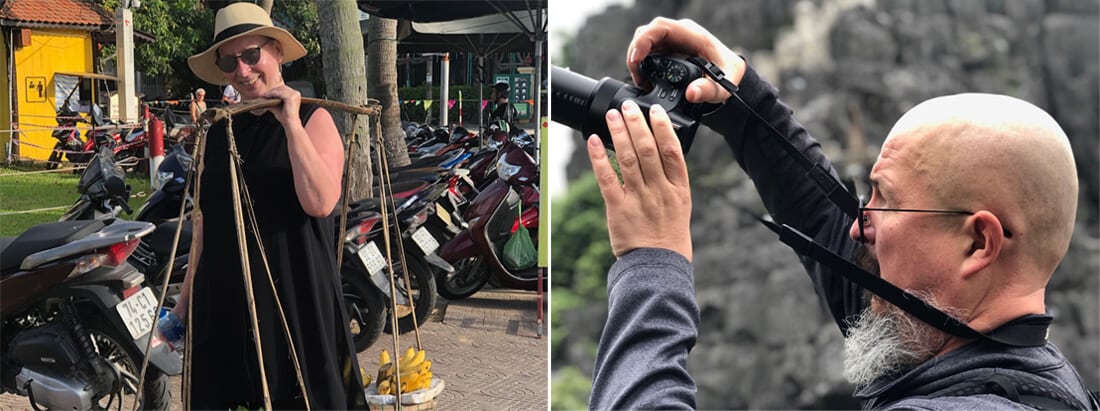
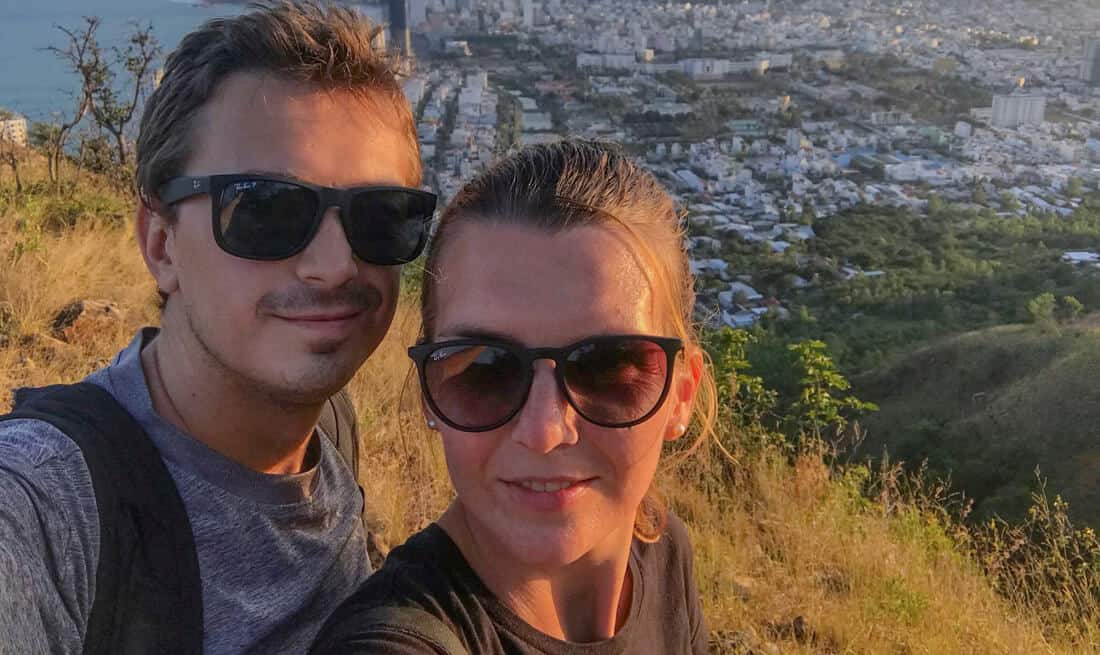
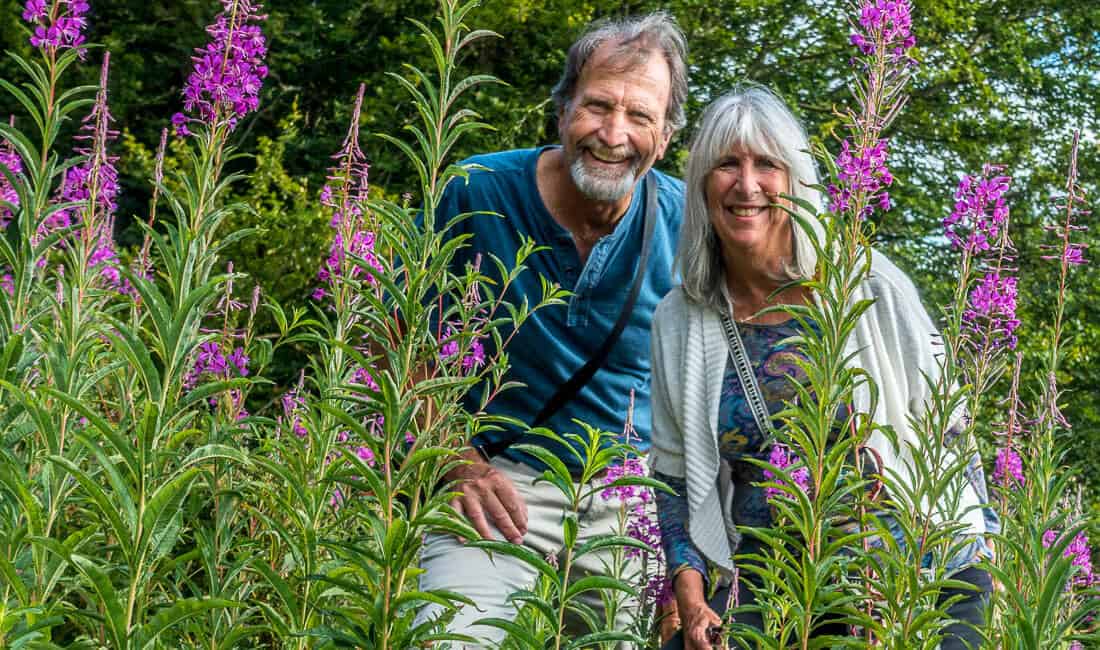

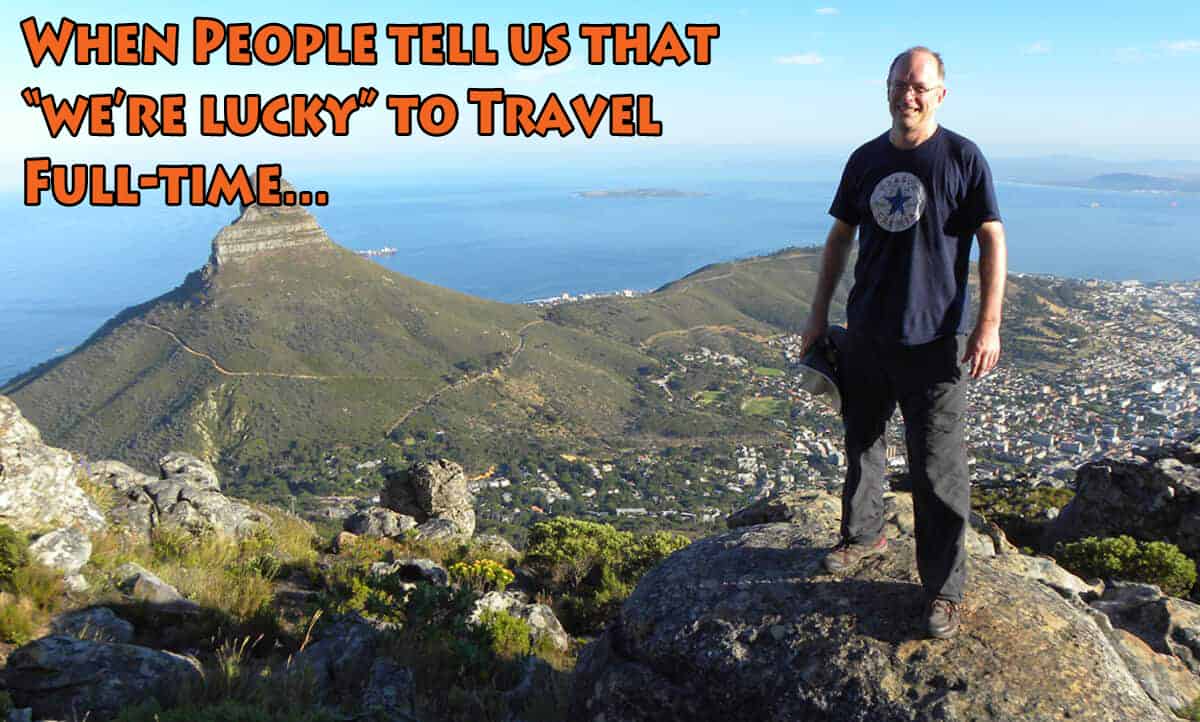
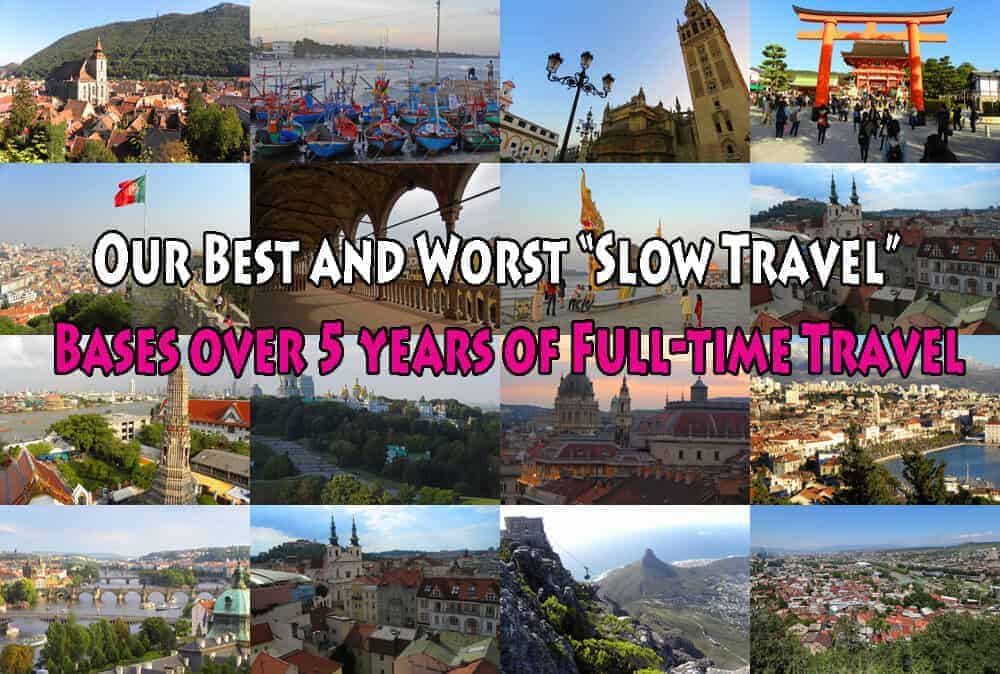
Thank you for the article! I am interested in learning more about slow travel, and I wonder if you could post some kind of “how to get started”. ( I looked but didn’t see anything like that on your site.) What kind of stuff do you own (just clothing?) and how much room does it take up (in suitcases)? What do you look for when selecting a destination (the where and when) and any tips on finding that information? (I really don’t know anything about visas. And is there anything else that needs to be arranged in advance aside from an apartment?) How do you bank? When Lisette has her job, was that income taxable in the country where you were living? Would it make sense to establish residency in a state/province with lower income tax rates before traveling, or does that not much matter?
Thank you in advance for sharing your knowledge!
Thanks for the comment Naomi. That’s a whole other post (or book) 🙂 But I’ll try to give you some brief answers.
1) Packing. We’ve learned over the years. The 1st year we had large bags (too many clothes). After that year we moved on to carry on sized suitcases and school bag-sized backpacks. Theoretically, we don’t have to check in anything when boarding a plane. Basics: clothes (and you learn that you don’t need much), computers, camera equipment, electronics, some basic toiletries. One of the issues if travelling full-time is packing for change of seasons. Often I’ve had boots and a jacket. You need multi-functional clothing and it’s better to throw out seasonal clothing and buy as you need. You don’t want to be carrying around toiletries either. Really, it’s about carrying the very basics and buying things as you need.
2) Destination. A blend of places we’ve always wanted to see and places that aren’t expensive. That’s why we don’t spent a lot of time in places like the UK, Scandinavian countries, Canada, US, Australia, New Zealand and instead stay in less expensive places (Eastern Europe, South East Asia, parts of Southern Europe).
3) Visa. You just have to look up any destination you’re interested in on the internet. Visas will depend on the destination and what citizenship you have.
4) Banking. We still have our Canadian bank accounts and use our home debit/credit cards.
5) We’re still Canadian citizens so we are charged taxes at home. Really, nothing has changed except that we’re not LIVING in Canada. Foreign income taxes: no, because we are full-time travellers. If we were residents of another country that would be a different matter (although most countries have a reciprocal agreement so that you don’t get double taxed).
6) changing residency. No, I don’t think that matters at all.
I wrote more in this post: The absolute worst thing about being a full time traveller
Hope that helps!
What an amazing post. Since I am not a young man already, the history of Paul and Paula was especially interesting for me. This couple are great.
Thanks Victor. P&P will be happy to hear that 🙂
Love this post, very interesting. Fascinating how people live “ordinary lives” but in different places, making destinations around the world home for a while. Also like that it’s a lifestyle that can be done on different budgets (I guess like any lifestyle choices) and by people in different stages in life.
I find the story of Mark and Anya inspiring and also like the honesty about the reality of some of the downsides of full time travel. I don’t know if we could handle being away from family, friends or not having a home.
Anyway, great article.
Thanks Jack.
I loved all the stories in different ways. I think everyone dreams of traveling full-time, but few actually have the ability to do it…but mostly I think people DO have the ability and the means but can’t get themselves to make the jump. So it’s inspiration to see people who actually do it. It might not be forever and it may turn out that the reality don’t meet the expectations – but at least they did it and can never regret not having carried out a dream.
Thank you for taking the time to comment.
great inspirations! Nice post!
Thank you Andy 🙂
This us one of my favourites! Three couples. All three love traveling but still depict a life that is not perfect even if most of us think it is.
Thank you Ivana. I also really enjoyed reading the different contributions, very interesting.